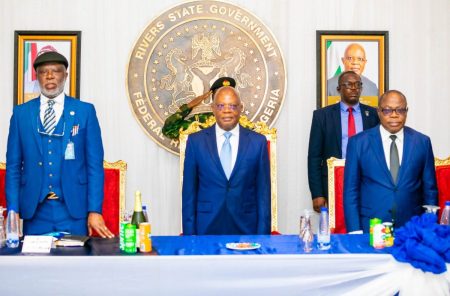28 August 2012, Sweetcrude, ABUJA – TO enhance a peaceful takeover and management of the Transmission Company of Nigeria, TCN, the new Chief Executive Officer, of the company, Mr. Don Priestman, says his management will work closely with the legacy TCN staff, particularly during the transitional months.
He stated this at a familiarization meeting convened by the Nigerian Electricity Regulatory Commission, NERC, in Abuja. He was accompanied by other senior management staff of the TCN.
According to him, the new management’s experience and technological wherewithal will be brought to bear in the management of the TCN, adding that the company expects to work with the skilled workers to deliver an efficient transmission system for the country.
He said, “We are assuring the staff of TCN that we are committed to the growth and development of the company, using the most modern technology to bring the vision of government towards efficient power transmission to millions of Nigerians.
“Our experience over many years in power systems management would certainly come to bear on the management of TCN, and we are more than ready to keep the promises we made on expanding power transmission infrastructure to provide Nigerians with more reliable power.”
Meanwhile, Priestman presented a diagnostic of TCN that will focus on the inherent manpower levels and skills gap deficits and succession planning.
He also presented a proposal for steps that will be taken towards full TCN unbundling and ring fencing of Transmission Service Provider, TSP; System Operator, SO; and Market Operator, MO, functions by way of sufficient sustainable TCN revenues and capital budget approvals, staff training, skills development and succession planning and strong enforcement of Market Rules by NERC, to name a few.
The Electric Power Sector Reform, EPSR, Act of 2005 requires that TCN be made up of two entities namely System Operations and the Transmission System Provider. Market Operations which is domiciled in System Operations, is also to be ring fenced.
Ring fencing refers to separation that translates to financial and operational autonomy. It is believed that the separation of these entities will lead to reduction of bureaucracy and ultimately enhance efficiency.
Chairman/CEO of NERC, Dr. Sam Amadi, told the new TCN management that the Commission wanted to see an efficient transmission system, and promised to work closely with them to realize this.
Manitoba Hydro International recently won the management contract on April 3, through a bidding process conducted by the Bureau of Public Enterprises, BPE.
They assumed operational control of the company on July 30, 2012. The TCN is one of the companies scheduled for Management Contract deal to transform it into a financially sustainable, self-sufficient and market-driven player in the power sector.
Manitoba, which is the electric power and natural gas utility in the province of Manitoba, Canada, currently operate 15 interconnected generating stations and has more than 572,000 electric power customers and over 263,000 natural gas customers.
Its world-class technical and organizational capabilities have enabled it to perform power sector works in over 60 countries.
Within Manitoba Hydro’s system, there exists a total of 9,089 km of transmission lines throughout the province of Manitoba, spread across a wide variety of physical terrain, including swamps, permafrost and bedrock.
TCN is one of the 18 successor companies carved out of Power Holding Company of Nigeria, PHCN. It combines the functions of a transmission services provider, a system operator and a market operator, all of which are central to the sustainability and development of the electricity sector.
Following the unbundling exercise, TCN emerged as one of the successor companies of PHCN and was scheduled for a management contract in order to transit the company into a financially sustainable, stable, self-sufficient and market-driven company.




